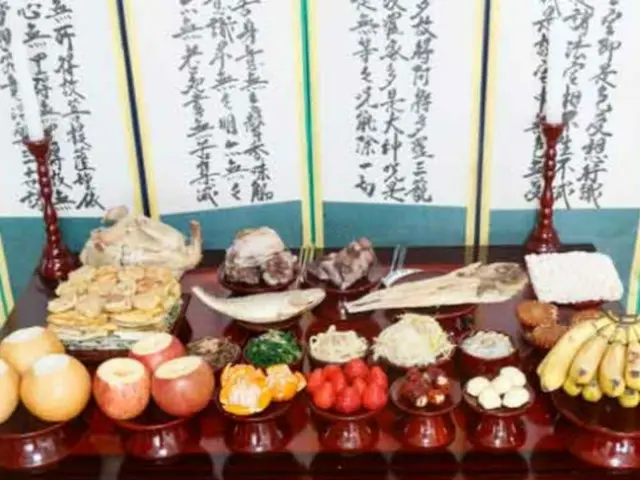It will be a six-day long holiday. Expressway restrictions have begun as early as the 27th, and it looks like this year we will see a return to the ``massive movement of people'' seen during mid-autumn celebrations before the coronavirus pandemic.
Mid-autumn celebration is one of Korea's most famous festivals, along with Seollal (Lunar New Year), and it is a common way for relatives to gather in their hometowns to visit their ancestors' graves and have a meal. Also, on the morning of mid-autumn celebration.
A festival called ``Chare'' is held to welcome the spirits of the ancestors, and many foods such as vegetable namul, meat, and fish are offered on the altar. Large-scale homecoming movement called the "Great Ethnic Migration"
Before the coronavirus outbreak, the sight of heavy traffic jams on expressways and crowded Seoul stations was commonplace. However, the situation has completely changed due to the coronavirus pandemic. Many people refrain from returning to their hometowns, and grave mowing services are available.
services and online grave visits have also appeared. In addition, preparing for the tea ceremony requires a considerable amount of effort, and after the mid-autumn celebration is over, you may feel abnormalities in your spine or joints, or experience dizziness, headaches, abdominal pain, and palpitations.
It is said that the number of people complaining of symptoms such as these will increase. It is also known as ``Meibushi syndrome'' and is said to be particularly common among women. Preparations for the festival tend to be concentrated on women, and wives become overwhelmed with affection for their husbands who do nothing.
However, there are cases where the relationship deteriorates rapidly and ends in divorce. Job information site Job Korea conducted a survey of 1,921 male and female office workers in 2019 during the coronavirus pandemic, and found that
Four out of 10 people said they experienced depressive symptoms after preparing food for seasonal festivals or rituals. During the coronavirus pandemic, these traditional ways of celebrating mid-autumn celebrations are often simplified, and
One member of the department said, ``I was relieved that the burden had been reduced.'' However, this year, the traditional spectacle of mid-autumn celebrations, where relatives gather together, seems to be making a comeback.
Many companies pay bonuses in conjunction with mid-autumn celebrations, and the aforementioned Job Korea is a company employee.
According to the survey results of 747 people, 55.2% of respondents said they would receive a "mid-autumn celebration bonus." The average amount paid was 464,185 won (approximately 51,000 yen).
The rush to return home for the mid-autumn celebration holidays has already begun on the 27th. This year, for the first time in three years, tolls on expressways across the country will be free for four days from October 28th to October 1st. Originally Korean politics
The prefecture has waived tolls on expressways every year during Lunar New Year and mid-autumn celebration holidays, but from mid-autumn celebration in 2020 to last year's Lunar New Year, to prevent the spread of coronavirus infection. Therefore, those who urge people to impose restrictions and refrain from traveling.
As a measure, tolls were collected as usual. This year's mid-autumn celebration will be on September 29th (Friday), and since the days before and after the mid-autumn celebration are holidays, and October 1st is a Sunday, it was decided from the beginning that it would be a four-day holiday.
was. Since October 3rd is National Foundation Day and a public holiday, people's expectations were high that if October 2nd was a holiday, it would be a six-day holiday, and after considering it, the government decided that October 2nd would be a holiday. The day
On the 5th of this month, the Cabinet decided to make it a temporary public holiday. There will be six consecutive holidays this year, and many people will be traveling not only domestically but also overseas. Chosun Ilbo, a Korean newspaper, recommends that Koreans want to visit during this year's mid-autumn celebration holidays.
Of the top five overseas cities that they would like to visit, three are Japanese. According to the paper, travel site Booking.com has searched for ``accommodation'' on its website by Koreans.
When the cities were tallied, the top spot was Tokyo, second place was Paris, France, third place was Osaka, fourth place was Fukuoka, and fifth place was Rome, Italy. A similar survey, conducted in conjunction with last year's mid-autumn celebration, found that the top five cities
No Japanese cities were included. According to the paper, Booking.com said, ``The record depreciation of the yen seems to have had a big impact.Compared to last year, the rankings of Japanese cities have improved.
"Karu". Additionally, this year, with six consecutive holidays, long-distance travel to Europe is popular, with many people wanting to travel to Spain, Italy, the UK, and Switzerland.
cormorant. This year, a lively and lively scene is expected to spread across South Korea, a complete change from the mid-autumn celebration holidays during the coronavirus pandemic, which had various restrictions.
2023/09/28 11:06 KST
Copyrights(C)wowkorea.jp 5

